Signs Your Senior Dog is Healthy at Night: What Every Pet Parent Should Know
Watching your senior dog struggle through the night is heartbreaking. Learn to recognize healthy nighttime behavior in older dogs and when to seek veterinary help for restlessness, anxiety, or sleep disturbances.
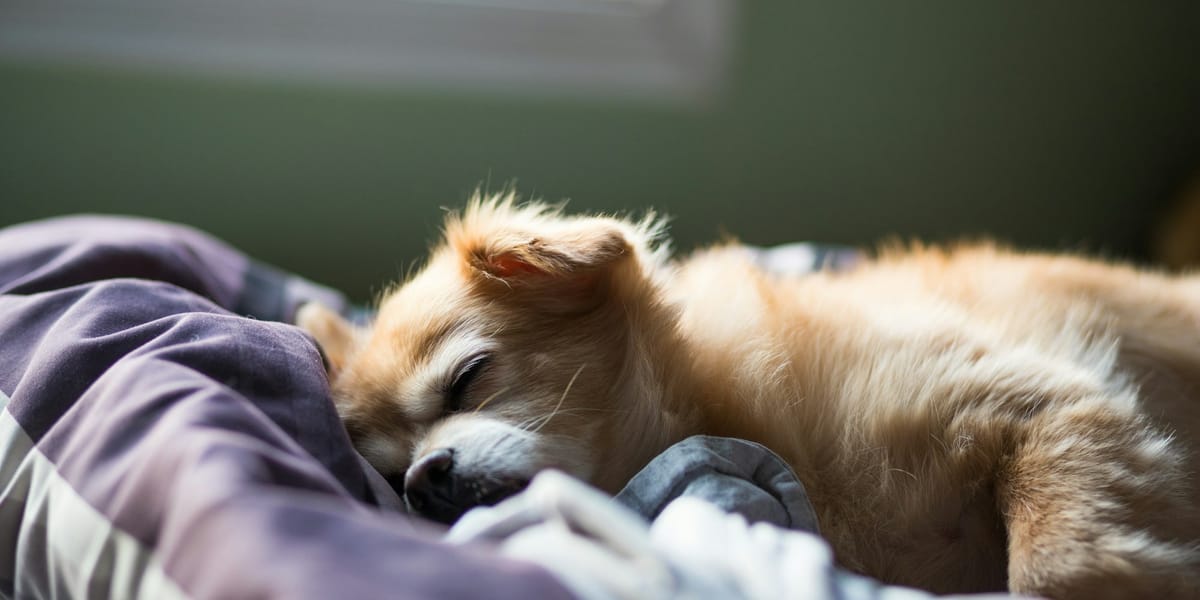
Watching your aging companion struggle through the night can be heartbreaking. You hear the pacing, the panting, or the whining, and you wonder if your senior dog is truly okay. Understanding what healthy nighttime behavior looks like in older dogs gives you peace of mind and helps you spot potential problems early.
As dogs enter their golden years, their sleep patterns naturally change. But how do you distinguish between normal aging and signs that something's wrong? Let's explore what healthy nighttime behavior looks like for senior dogs and when you should be concerned.
What Normal Senior Dog Sleep Looks Like
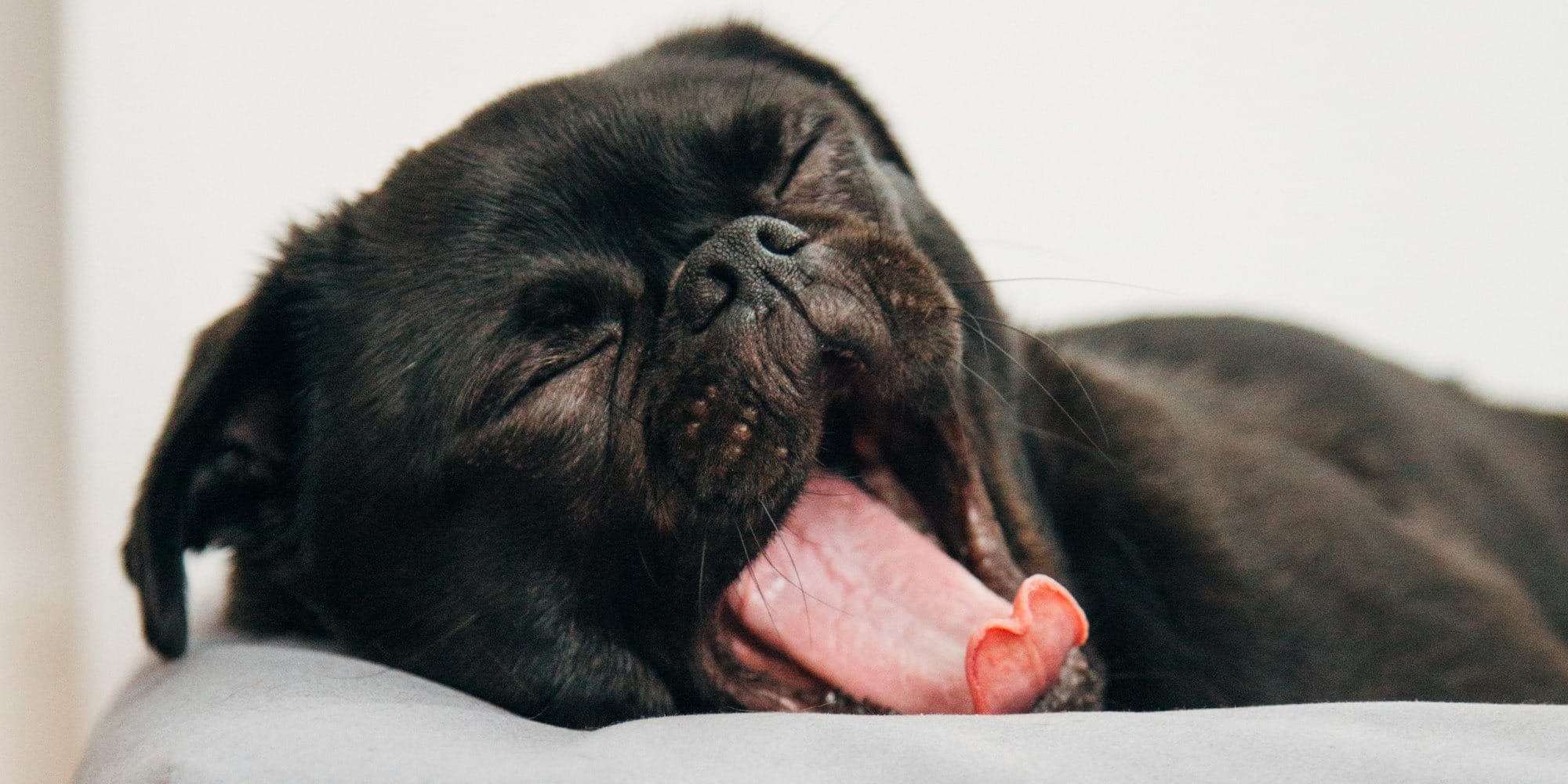
Senior dogs typically sleep more than their younger counterparts, often resting 16 to 20 hours per day compared to the 12 to 18 hours adult dogs need. This increased sleep is completely normal as their energy levels naturally decrease with age.
A healthy senior dog at night will:
Settle Down Relatively Easily
Your older dog should be able to find a comfortable position and drift off to sleep within a reasonable time. While they might take a bit longer than they used to, excessive restlessness indicates a problem.
Sleep Through Most of the Night
Healthy senior dogs can still sleep for several hours at a stretch. They may wake up once or twice for water or a bathroom break, but constant waking throughout the night isn't normal.
Wake Up Calmly
When your senior dog does wake during the night, they should appear calm and oriented. Brief stretches or position changes are fine, but frantic pacing or confusion signals an issue.
Show Regular Breathing Patterns
During deep sleep, your dog's breathing should be steady and unlabored. You might notice some twitching or quiet dream sounds during REM sleep, which is perfectly healthy.
Key Signs Your Senior Dog is Sleeping Well at Night
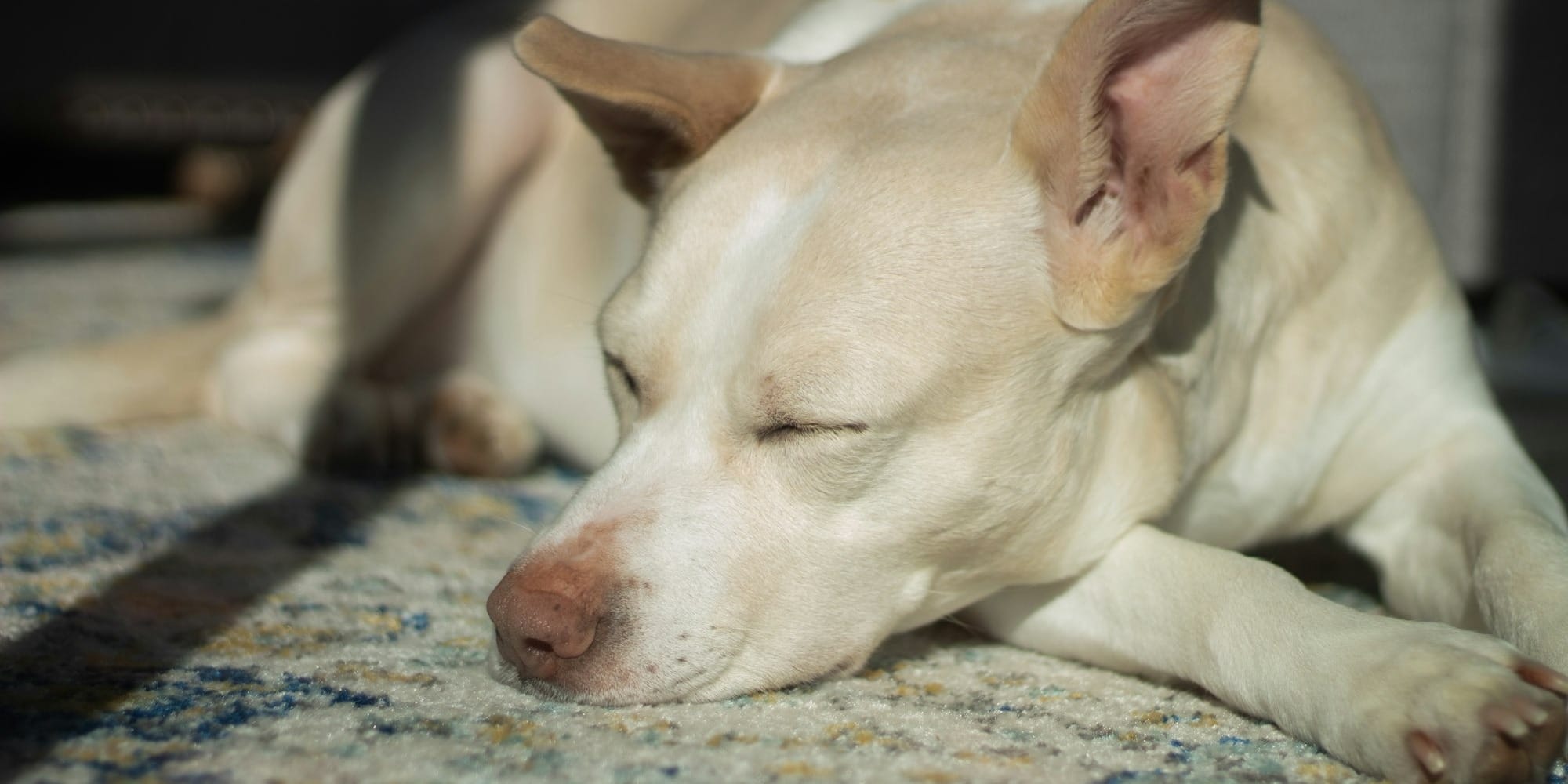
1. Consistent Sleep Schedule
Your older dog maintains a predictable bedtime routine and settles down around the same time each evening. This consistency indicates they're comfortable and their internal clock is functioning well.
2. Comfortable Body Position
A relaxed senior dog will stretch out or curl up comfortably in their bed. If your dog constantly shifts positions or can't seem to get comfortable, this could signal joint pain or other discomfort.
3. Minimal Nighttime Vocalization
While some older dogs may occasionally sigh or groan when changing positions, healthy senior dogs shouldn't regularly whine, bark, or howl during the night. Excessive vocalization often points to anxiety, pain, or cognitive issues.
4. No Excessive Panting
Light breathing is normal, but heavy panting at night when the temperature is comfortable suggests your dog may be experiencing discomfort, anxiety, or a medical condition. If the panting is loud, rapid, and paired with gulping water all night, it’s often the first clue to Cushing’s, heart disease, or diabetes - Read the full vet checklist: Senior Dog Panting at Night & Drinking Lots of Water
5. Staying in Their Sleeping Area
A content senior dog will remain in their designated sleeping spot throughout most of the night. Constant wandering or pacing indicates restlessness that needs addressing.
6. Appropriate Bathroom Control
Healthy senior dogs should maintain bladder and bowel control through the night, though they may need one bathroom break. Frequent accidents or urgency could indicate a urinary tract infection, kidney issues, or other health concerns.
7. Alert and Oriented Upon Waking
When morning arrives or they wake during the night, your senior dog should recognize where they are and respond normally to you. Disorientation or confusion may signal cognitive dysfunction.
Red Flags: When Nighttime Behavior Becomes Concerning
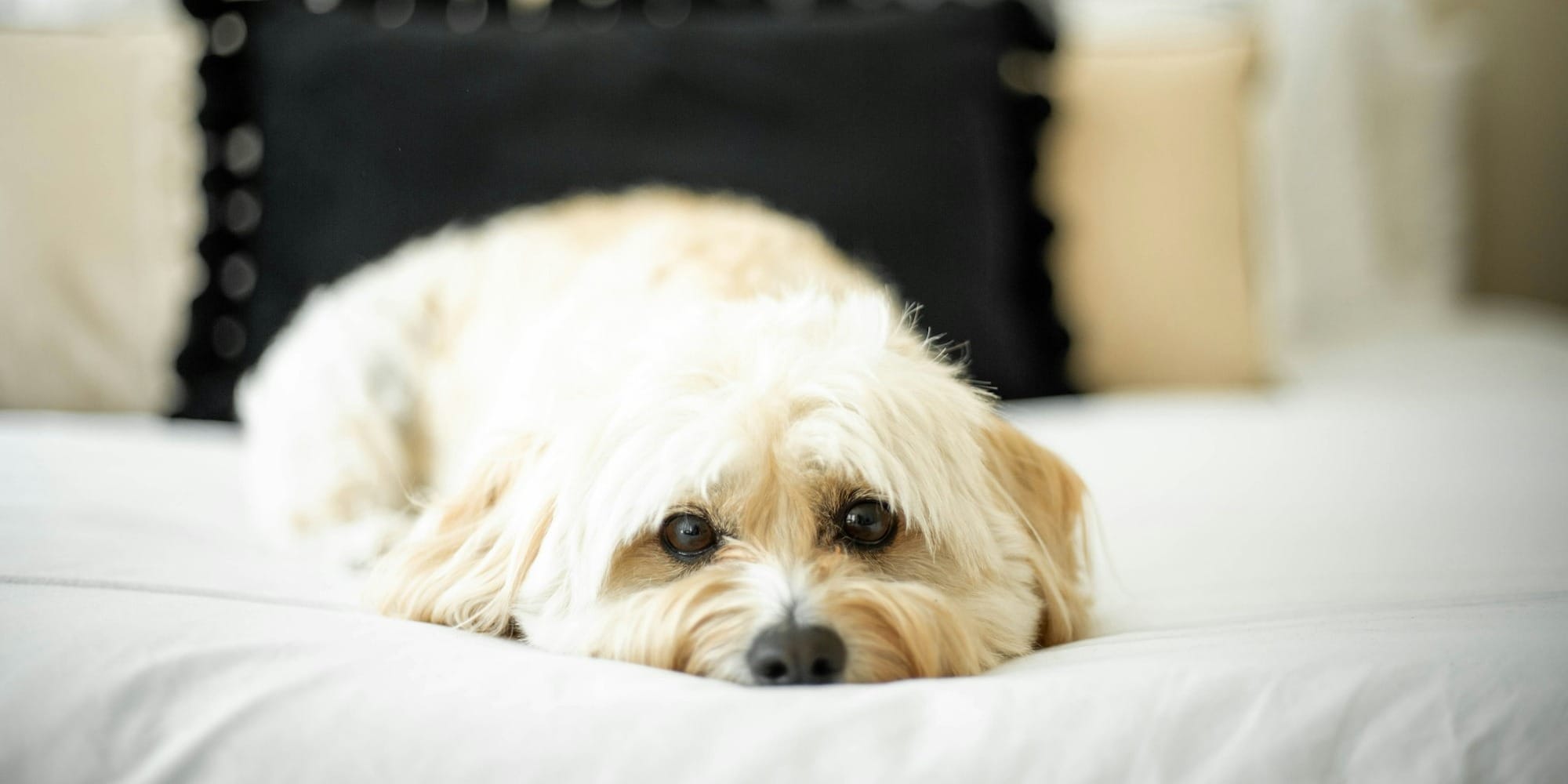
Not all changes in your senior dog's nighttime routine are harmless. Watch for these warning signs:
Sundowning Symptoms
Some senior dogs experience increased anxiety and confusion as evening approaches, similar to sundowning in humans with dementia. This pattern includes:
- Heightened restlessness after sunset
- Pacing in repetitive patterns
- Staring at walls or into corners
- Increased vocalization in the evening and night
- Appearing lost in familiar spaces
Persistent Restlessness
If your dog can't settle down despite having a comfortable bed, calm environment, and adequate exercise during the day, this warrants investigation. Restlessness often stems from pain, anxiety, or cognitive decline.
Changes in Breathing
Coughing, wheezing, or labored breathing at night could indicate heart disease, respiratory issues, or other serious conditions requiring immediate veterinary attention.
Excessive Thirst or Urination
Senior dogs who constantly wake to drink water or need to go outside multiple times per night might have diabetes, kidney disease, or Cushing's disease.
Aggressive or Unusual Behavior
Sudden personality changes at night, including aggression toward family members or other pets, often indicate pain or cognitive dysfunction that needs professional evaluation.
Common Causes of Poor Sleep in Senior Dogs
Understanding why your older dog might struggle at night helps you address the root cause:
Canine Cognitive Dysfunction
This condition affects up to two-thirds of dogs in their mid-teens and can significantly disrupt sleep patterns. Dogs with cognitive dysfunction may lose track of day-night cycles, leading to increased nighttime activity and anxiety.
Arthritis and Joint Pain
Musculoskeletal pain often intensifies at night when dogs are less distracted. Your senior dog might struggle to find a comfortable position or feel stiff after lying down for extended periods.
Anxiety and Stress
Changes in vision or hearing can make nights particularly stressful for senior dogs. They may feel vulnerable in the dark or become startled by sounds they can't properly identify.
Medical Conditions
Various health issues can interfere with sleep, including:
- Urinary tract infections causing frequent bathroom needs
- Thyroid imbalances affecting energy and anxiety levels
- Heart disease leading to breathing difficulties
- Digestive problems causing discomfort
How to Support Healthy Sleep in Your Senior Dog
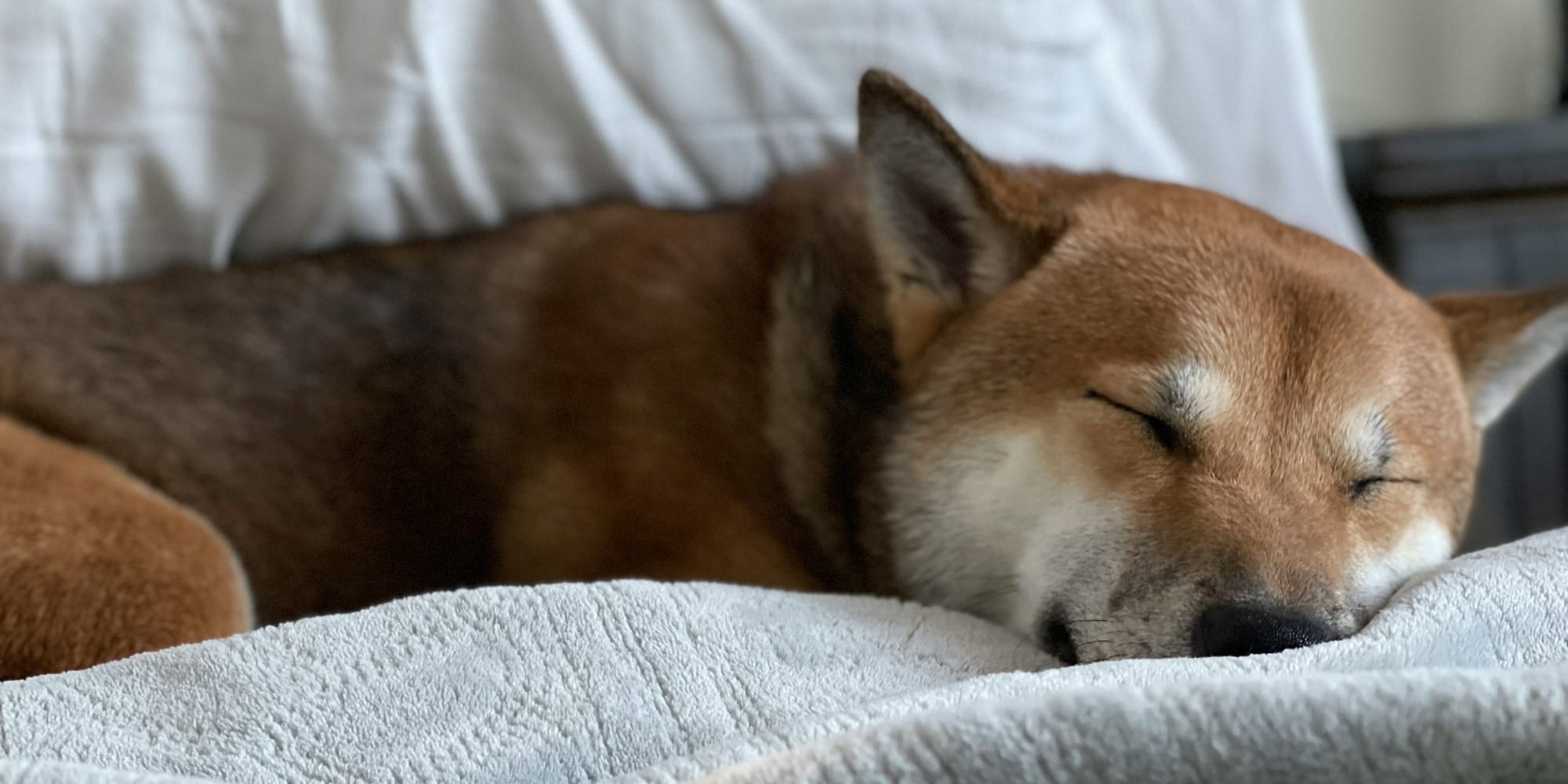
Creating the right environment and routine dramatically improves your older dog's nighttime comfort:
Invest in Proper Bedding
An orthopedic or memory foam bed provides essential joint support. Place the bed in an easily accessible location, avoiding stairs or obstacles that might be difficult for your senior dog to navigate at night.
Maintain a Consistent Routine
Feed your dog at the same times daily and establish a predictable bedtime ritual. This structure reduces anxiety and helps your senior dog feel secure. Consider a light evening walk and bathroom break right before bed.
Control the Environment
Ensure the sleeping area is:
- Quiet and away from household noise
- Kept at a comfortable temperature (older dogs are more sensitive to heat and cold)
- Dimly lit if your dog has vision problems (night lights can help)
- Free from drafts or excessive air conditioning
Provide Appropriate Exercise
Moderate daily activity helps tire your dog out naturally, but avoid vigorous exercise close to bedtime. Adjust walks and playtime to your senior dog's physical capabilities.
Address Pain Proactively
If you suspect your dog is uncomfortable, consult your veterinarian about pain management options. Many senior dogs benefit from joint supplements, anti-inflammatory medications, or alternative therapies like acupuncture.
Consider Calming Aids
For dogs with anxiety, pheromone diffusers, calming supplements, or even anxiety wraps can provide relief. Always discuss these options with your vet before starting any new treatment.
When to Contact Your Veterinarian
Schedule a vet appointment if you notice:
- Sudden changes in sleep patterns lasting more than a few days
- Signs of pain like whimpering, excessive licking, or difficulty moving
- Disorientation or confusion, especially at night
- Increased thirst paired with frequent urination
- Any combination of the red flags mentioned earlier
Regular check-ups every six months are essential for senior dogs. These visits allow your vet to catch developing issues early and adjust care as needed.
Creating a Senior-Friendly Nighttime Routine
Here's a practical bedtime routine that promotes healthy sleep:
Two Hours Before Bed:
- Offer a light, easily digestible dinner
- Provide fresh water but avoid excessive drinking right before sleep
One Hour Before Bed:
- Gentle play or short walk appropriate for your dog's mobility
- Final bathroom break
At Bedtime:
- Guide your dog to their comfortable sleeping area
- Ensure the environment is calm and temperature-controlled
- Consider soft background noise if it helps your dog relax
- Give any prescribed evening medications or supplements
Frequently Asked Questions
How do I tell if my senior dog is healthy?
A healthy senior dog maintains a consistent appetite, shows interest in daily activities, has clear eyes and ears, displays regular bathroom habits, and can sleep through most of the night without excessive restlessness or confusion.
Is my senior dog sundowning?
Sundowning in dogs appears as increased anxiety, confusion, pacing, or vocalization in the evening and nighttime hours. If your dog becomes more restless as the sun sets, seems disoriented, or paces repetitively at night, they may be experiencing this condition commonly associated with canine cognitive dysfunction.
Why is my old dog so unsettled at night?
Senior dogs become unsettled at night due to various reasons including arthritis pain, cognitive dysfunction, anxiety from sensory decline (vision/hearing loss), urinary tract infections, or other medical conditions. A veterinary exam can help identify the specific cause.
What is the most common cause of death in senior dogs?
The most common causes of death in senior dogs include cancer, heart disease, kidney failure, and complications from cognitive dysfunction. Regular veterinary check-ups every six months help detect and manage these conditions early.
What age is considered old for most dogs?
Dogs are generally considered senior around 7 years old, though this varies by breed and size. Large breed dogs age faster and may be considered senior at 5-6 years, while small breeds might not reach senior status until 8-10 years old.
What are the three stages of dog dementia?
Dog dementia (canine cognitive dysfunction) progresses through three stages: Stage 1 (Mild) - subtle changes like minor confusion or altered sleep; Stage 2 (Moderate) - increased disorientation, disrupted sleep-wake cycles, house soiling; Stage 3 (Severe) - severe confusion, inability to recognize family members, complete loss of house training, and significant anxiety.
The Bottom Line
Your senior dog's nighttime behavior tells you a lot about their overall health and comfort. Healthy older dogs should be able to settle down, sleep for reasonable stretches, and wake calmly. Any significant changes in sleep patterns, increased anxiety, or signs of discomfort warrant a conversation with your veterinarian.
Remember, aging doesn't have to mean sleepless nights for you or your beloved companion. With the right support, environment, and medical care, your senior dog can enjoy peaceful, restorative sleep well into their golden years. Pay attention to the signs, trust your instincts, and don't hesitate to seek professional guidance when something doesn't feel right.
Your faithful friend has given you years of unconditional love. Ensuring their comfort during their senior years is one of the most important ways you can return that devotion.



